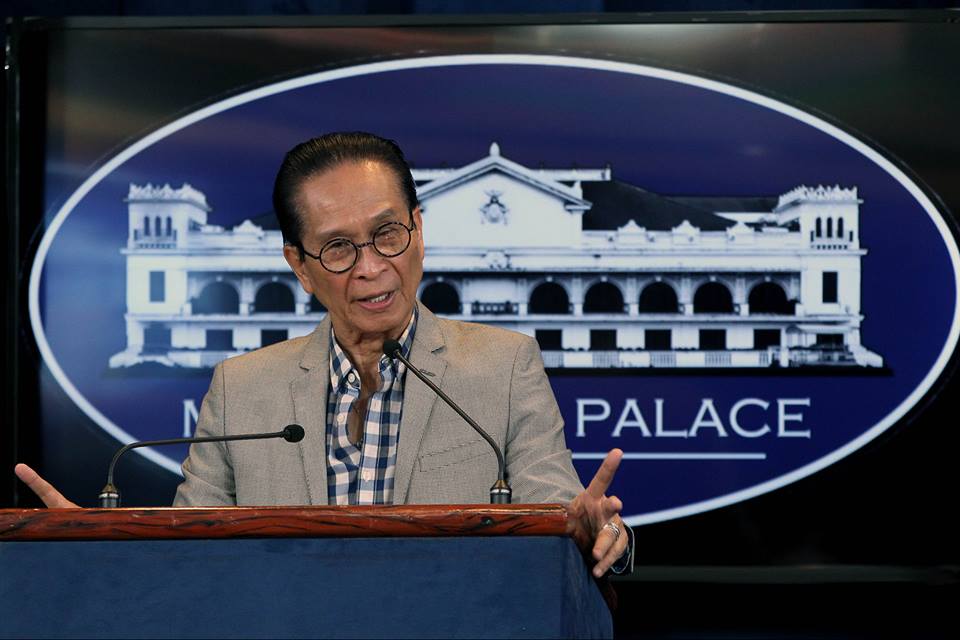News
Malacañang assures corrupt-free PHP10-B rice fund

Presidential Spokesperson Salvador Panelo allayed concerns raised by farmers that the RCEP would be corrupted just like the fertilizer fund scam saying safeguards will be in place preventing a similar incident. (File Photo: Office of the Presidential Spokesperson/Facebook)
MANILA — Malacañang on Tuesday said that it will have zero tolerance for corruption involving the PHP10-billion Rice Competitiveness Enhancement Fund (RCEF) under the recently-signed Rice Tariffication Act.
Presidential Spokesperson Salvador Panelo allayed concerns raised by farmers that the RCEP would be corrupted just like the fertilizer fund scam saying safeguards will be in place preventing a similar incident.
“Good governance is the hallmark of the Duterte administration and the President has zero tolerance against corruption and wastage of taxpayers’ money,” Panelo said in a statement.
The fertilizer fund scam involved PHP728 million worth of funds meant for fertilizers but diverted to allegedly fund the campaign of former President and now House Speaker Gloria Macapagal Arroyo in 2004.
In 2014, the Office of the Ombudsman dismissed the graft case against Arroyo in connection with the fertilizer fund controversy due to lack of “factual or legal basis”.
Panelo said that the Duterte administration will also continue to exercise “accountability and transparency” in all levels of the bureaucracy.
He explained that under the law, Department of Agriculture (DA) Secretary Emmanuel “Manny” Piñol must be accountable and responsible for the RCEP.
Panelo said the DA, in consultation with farmers’ cooperatives and organizations and local government units, must also validate and update the master list of eligible beneficiaries, which include farmers, farmworkers, rice cooperatives and associations.
Moreover, the spokesperson said there will also be a periodic review of the RCEP conducted by the Congressional Oversight Committee on Agricultural and Fisheries Modernization (COCAFM).
Panelo, meanwhile, asked rice farmer representatives and vital stakeholders to be pro-active in the discussion and review of the crafting of the Rice Industry Roadmap and Internal Rules and Regulations with other concerned agencies.
He said that this will allow the effective and efficient implementation of the new measure, including assuring safeguards aimed at eliminating corruption.
On Feb. 14, Duterte signed the Rice Tariffication Act, which he earlier certified as urgent, expecting to lower the prices of rice, protect farmers from competition, and ease inflation.
Panelo earlier said that farmer groups have the right to question the legality of the law if they feel that it would cause more harm than good to the agriculture sector.
In a Palace briefing, Department of Finance (DOF) Assistant Secretary Tony Lambino said that the Rice Tarffication Act will take effect on March 5.
Lambino explained that of the PHP10-billion RCEP, 50 percent will be used for mechanization to improve farmers’ competitiveness and productivity.
“What we want to do is increase the competitiveness and productivity of our rice farmers. There are 57 provinces that grow rice that can be internationally competitive,” Lambino said.
Since the law strips the National Food Authority (NFA) of its power to require importers to get import licenses, Lambino said that tariffication should be done “correctly”.
“Taliwas po sa tariffication ang import licensing function ng NFA (The licensing function of the NFA goes against tariffication). Because we tariffy, we should tariffy correctly which is wala na pong (there should be no more) import licenses,” Lambino said.





















